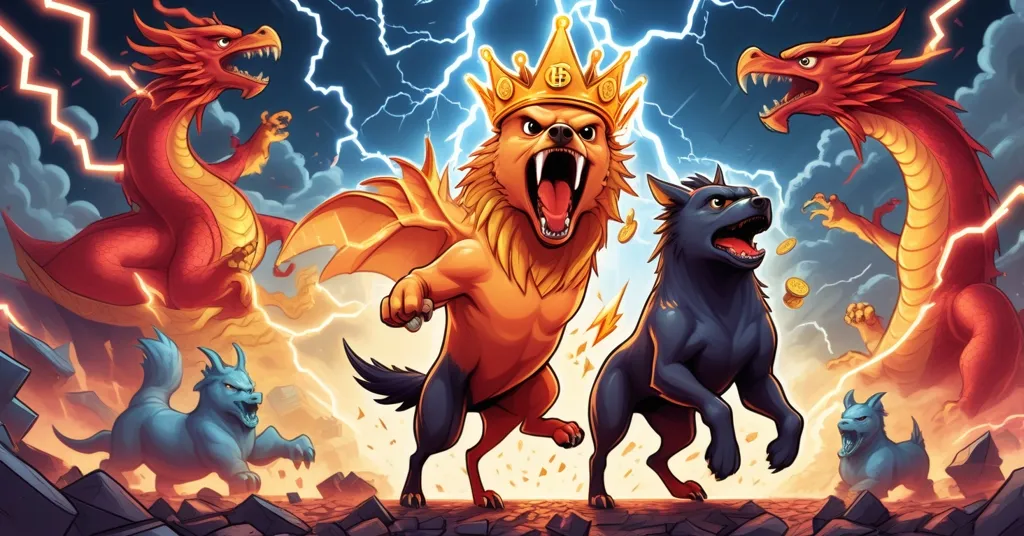China Slams US for $13B Bitcoin Heist: Geopolitical Drama Fuels $MAXI Hype

China Accuses US of $13 Billion Bitcoin Heist: Geopolitical Clash and the $MAXI Wildcard
Bitcoin, the poster child of financial freedom, has been dragged into a geopolitical slugfest as China points fingers at the United States for allegedly masterminding a $13 billion heist. This explosive claim, centered on the theft of 127,272 BTC from the LuBian mining pool, isn’t just a headline—it’s a stark reminder that even decentralized systems aren’t safe from global power plays. As trust in Bitcoin wavers, could this drama spark interest in rebellious, community-driven tokens like Maxi Doge ($MAXI)? Let’s break it down.
- Shocking Claim: China alleges the US stole 127,272 BTC, valued at $2.1 billion in 2020 and now worth $13 billion, from LuBian mining pool.
- Digital Warfare: Framed as a state-level hacking operation, this accusation turns Bitcoin into a geopolitical weapon.
- Market Fallout: Shaken confidence in Bitcoin might redirect capital to altcoins, including meme coins like $MAXI that thrive on chaos.
The Accusation: A $13 Billion Bitcoin Grab
China’s bombshell comes straight from the National Computer Virus Emergency Response Center (CVERC), which claims the US executed a “state-level hacking operation” in 2020 against LuBian, a major Bitcoin mining pool. For those new to the crypto game, mining pools are like digital co-ops where miners combine their computing power to solve complex puzzles and earn Bitcoin rewards—think of it as a global lottery with insane odds. LuBian was a big player back then, and losing 127,272 BTC was a gut punch. At the time, that haul was worth $2.1 billion, but thanks to Bitcoin’s wild price surge—driven by mass adoption, institutional buy-ins, and sheer market mania—it’s now valued at a staggering $13 billion. That’s not just theft; it’s a fortune that could shift the balance of digital power.
But what exactly is a “state-level hacking operation”? It’s a cyberattack allegedly orchestrated or backed by a government, often for strategic or economic gain. Think of it as a modern-day heist, except instead of robbing a bank with guns, it’s cracking code with state-funded tech wizards. The CVERC’s report doesn’t provide hard evidence—at least not publicly—and specifics like the hacking methods or timelines remain murky. Without independent verification or a US response, which is still pending, we’re left with a high-stakes accusation that’s more narrative than proven fact. Still, the implications are massive, and they hit at the core of what Bitcoin stands for. For deeper insight into this shocking Bitcoin heist claim and its ties to $MAXI, the details are worth exploring.
Geopolitical Fallout: Bitcoin as a Pawn
Bitcoin emerged from the ashes of the 2008 financial crisis as a rebellious answer to centralized control—a currency without borders, immune to government meddling. Or so we thought. This accusation flips that ethos on its head, positioning Bitcoin as a shiny new toy in the digital arms race between superpowers. China’s framing isn’t just about a single theft; it’s a signal that cryptocurrencies are fair game for nation-states looking to flex muscle or settle scores. And let’s not play naive—both the US and China have dirty laundry in the cyber warfare department. From alleged Chinese hacks on US infrastructure to North Korean Bitcoin thefts tied to state actors, the precedent for governments meddling in digital assets is well-established. So, whether this specific claim holds water or not, the message is clear: Bitcoin’s neutrality is under siege.
Playing devil’s advocate, could this be a distraction? China’s own history with crypto—banning mining, cracking down on exchanges—might suggest political motives behind the timing of this report. Pointing fingers at the US could deflect attention from domestic policies or past actions. On the flip side, if the US responds, expect counterclaims or denials, possibly accusing China of similar digital misdeeds. Without concrete proof, this feud risks becoming a propaganda ping-pong match, leaving Bitcoin holders caught in the crossfire. The real question is, could your wallet or exchange account become collateral damage in this escalating digital cold war?
Market Reactions: Trust Under Siege
Bitcoin has toughed out plenty of disasters—think Mt. Gox’s collapse, Silk Road’s shutdown, or endless regulatory threats. But a state-sponsored heist accusation lands differently. It’s not just about losing money; it’s about losing faith. If investors start questioning Bitcoin’s security or its promise of independence, we could see capital bleed out to other corners of the crypto space. And no, I’m not betting on Ethereum or Solana to soak up all the runoff. The real dark horses are the scrappy, narrative-driven players—altcoins and meme coins that feed on chaos and cultural backlash.
Why does this matter to everyday users? If you’re holding Bitcoin in a wallet or trading on an exchange, geopolitical risks aren’t some abstract concept. Centralized points like mining pools or trading platforms are vulnerable—LuBian’s alleged breach proves that. While Bitcoin’s blockchain itself is incredibly secure due to its decentralized network of nodes, the entry and exit points (exchanges, pools, even personal wallets) are often weak links. A state actor with resources could target these, and that’s a sobering reality for anyone in the space, from newbies to OGs. So, while Bitcoin’s core tech might shrug off this drama, the perception of risk could still spook the market.
Unexpected Wildcard: The Rise of $MAXI
Enter Maxi Doge ($MAXI), a meme coin that’s trying to capitalize on this mess with a mix of Bitcoin maximalist swagger and Dogecoin’s viral charm. For the uninitiated, meme coins are cryptocurrencies often born from internet jokes or trends, lacking serious utility but capable of explosive growth through community hype. Dogecoin ($DOGE), with its iconic Shiba Inu mascot, rules a $36.1 billion dog-themed market, and $MAXI wants in. Priced at a measly $0.0002675 with a tempting 77% staking APY, it’s pitched as a tribute to Bitcoin purists—those who believe BTC is the only crypto worth caring about—while borrowing the playful, retail-friendly vibes of meme culture.
The project’s tokenomics scream hype machine: 40% of its supply is dedicated to marketing, including a “Maxi Fund” for promotional antics. Their presale has already pulled in $3.9 million, a decent haul for a token with little fundamental value. Some are even tossing around price targets like $0.0058 by late 2026, but let’s be blunt—those numbers are pure speculation, often just a dressed-up pitch to lure in suckers. We’re not here to shill; we’re here to dissect. $MAXI’s relevance to this geopolitical storm lies in its narrative. If Bitcoin’s image as a bastion of freedom cracks under state interference, disillusioned investors might flock to tokens like $MAXI that symbolize a middle finger to institutional overreach. It’s less about tech and more about sticking it to the man.
But hold your horses—meme coins are a gamble, and not the fun kind. For every Dogecoin that defies logic and thrives, there are countless flops or outright scams. Rug pulls, where developers vanish with investor funds, are rampant. Regulatory scrutiny is tightening, and most meme coins lack any real-world use case. $MAXI might bark up Bitcoin’s tree, but will it bite or whimper out in the next market dump? If you’re tempted, do your homework and don’t stake more than you can afford to lose. It’s a sideshow, not the main event.
Bitcoin’s Soul: Decentralization at a Crossroads
Zooming out, this China-US spat is a gut check for the crypto ethos. Bitcoin was built to be untouchable—a system where no government or corporation could interfere. Yet state-level accusations, whether true or fabricated, erode that ideal. If superpowers are willing to weaponize digital assets, what does that mean for privacy and security? Could this accelerate interest in privacy-focused coins like Monero or push users toward less traceable systems? Or will it trigger harsher global regulations, strangling innovation under the guise of “protection”? The risks are real, and they challenge the very principles that birthed this movement.
On the optimistic side, this could be Bitcoin’s proving ground. Its network has survived worse, from hacks to outright bans, and its decentralized design makes direct attacks on the blockchain itself a logistical nightmare. As a Bitcoin maximalist at heart, I believe BTC’s resilience and long-term value as sound money will outshine temporary FUD. But I’m not blind—altcoins and other blockchains like Ethereum carve out vital niches, solving problems Bitcoin can’t or shouldn’t tackle. Even meme coins like $MAXI have a weird cultural role, acting as a pressure valve for a market that’s often too damn serious. Decentralization isn’t a monolith; it’s a spectrum, and every project plays a part.
Key Takeaways and Questions
- What’s the real impact of China accusing the US of a $13 billion Bitcoin heist?
It recasts Bitcoin as a geopolitical target, potentially denting investor trust and exposing the vulnerability of decentralized systems to state interference. - Could this shake up the crypto market and push investors elsewhere?
Definitely—some might ditch Bitcoin for smaller, rebellious tokens like meme coins that channel frustration with institutional meddling. - Is there proof behind China’s claim of US hacking?
Not publicly—the CVERC report lacks hard evidence so far, and with no US rebuttal, it remains a heated allegation rather than a confirmed crime. - What’s Maxi Doge ($MAXI), and why does it matter here?
It’s a meme coin blending Bitcoin maximalism with Dogecoin’s hype, potentially gaining traction from Bitcoin’s controversy, though it’s a speculative and risky play. - Should crypto users fear geopolitical risks after this?
Hell yes—state actions can hit market sentiment, asset safety, and the perceived independence of cryptocurrencies, affecting everyone from casual holders to big players.
This geopolitical circus is a wake-up call for the crypto community. Bitcoin will likely weather the storm—its tech and network are too robust to buckle under one accusation. But the cracks in its untouchable image are showing, opening doors for innovation, rebellion, and even absurdities like $MAXI to sneak into the spotlight. Whether you’re a Bitcoin diehard or an altcoin explorer, one truth stands: the battle for financial freedom just got messier, and Satoshi’s vision of a borderless currency is now the newest turf for superpower showdowns. Buckle up—it’s going to be a bumpy ride.



